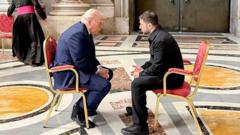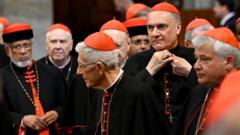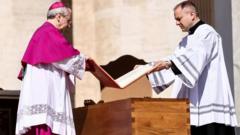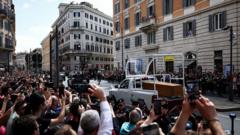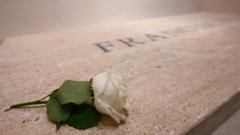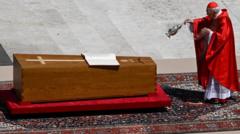As the Vatican prepares for a new pope, key terms and procedures guide this ritualistic transition.
Papal Transition 101: Understanding the Process Following Pope Francis' Death

Papal Transition 101: Understanding the Process Following Pope Francis' Death
A brief overview of the papal transition process in the wake of Pope Francis' passing
The death of Pope Francis on April 28, 2025, has initiated a vital phase in the Roman Catholic Church—the selection of his successor. For many, the process can seem opaque due to its ceremonial nature and Latin terminology. Central to this transition is the conclave, a gathering of cardinals who will convene starting May 7 to elect the next leader of the world’s 1.3 billion Catholics.
The term "conclave" stems from the Latin for "with key," indicating the seclusion enforced upon the cardinals during their deliberations. They remain within the Vatican, deprived of outside communication, and cast secret ballots until a two-thirds majority is achieved for a new pope. This secretive yet crucial decision-making is depicted in numerous portrayals, including the recent film “Conclave,” which offers insights into the nuances of the process.
The College of Cardinals comprises 252 members known as the church's "princes," who are tasked with the election once a pope dies. These cardinals, appointed by the pope, provide assistance in church matters, and their selection has far-reaching implications for the continuation of church teachings and leadership style. The dean, currently Giovanni Battista Re, acts as the moderator during this period; however, as he is over 80, he will not participate in the voting.
As the Church embarks on this momentous transition, the community watches closely to see how the new pope will guide the doctrine and values of an institution in continual evolution.
The term "conclave" stems from the Latin for "with key," indicating the seclusion enforced upon the cardinals during their deliberations. They remain within the Vatican, deprived of outside communication, and cast secret ballots until a two-thirds majority is achieved for a new pope. This secretive yet crucial decision-making is depicted in numerous portrayals, including the recent film “Conclave,” which offers insights into the nuances of the process.
The College of Cardinals comprises 252 members known as the church's "princes," who are tasked with the election once a pope dies. These cardinals, appointed by the pope, provide assistance in church matters, and their selection has far-reaching implications for the continuation of church teachings and leadership style. The dean, currently Giovanni Battista Re, acts as the moderator during this period; however, as he is over 80, he will not participate in the voting.
As the Church embarks on this momentous transition, the community watches closely to see how the new pope will guide the doctrine and values of an institution in continual evolution.

